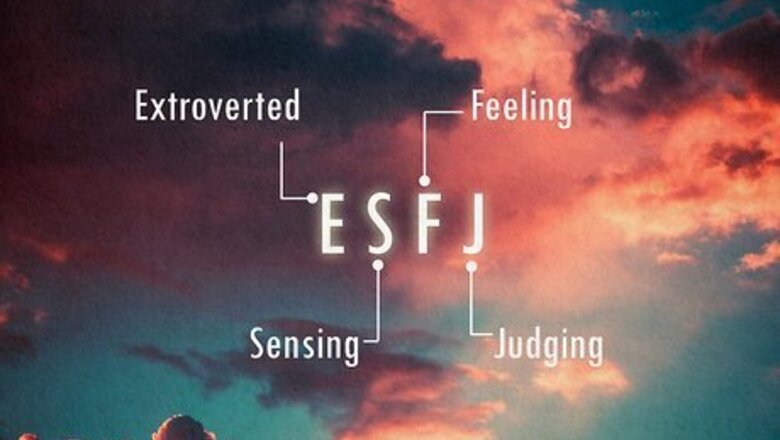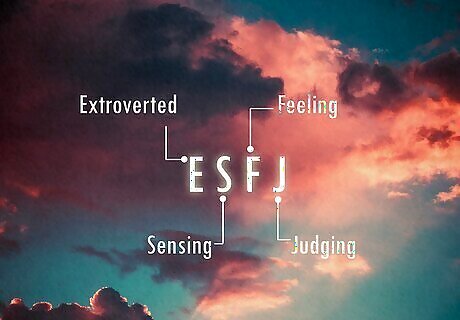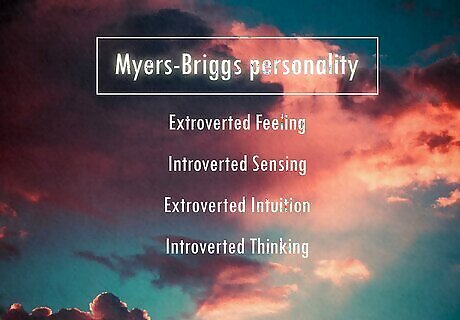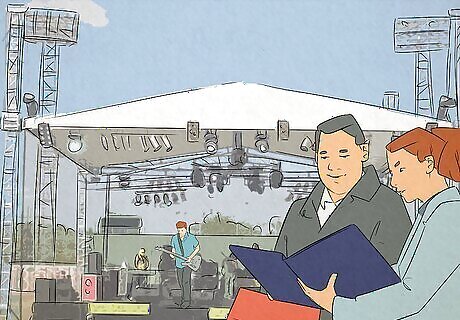
views
- ESFJ stands for extroverted, sensing, feeling, and judging.
- Also known as “The Caregiver,” ESFJs are sociable, helpful, reliable, organized, and principled.
- They thrive in structured work environments and careers that allow them to serve others. They make excellent nurses, doctors, teachers, and event planners.
What does it mean to have an ESFJ personality type?

If you have an ESFJ personality, you're outgoing, helpful, and organized. Also known as “The Caregiver” or “The Consul,” ESFJs are incredibly social, and they love to be of service to others. They also prefer structured and organized environments over chaotic ones. ESFJ stands for Extroverted, Sensing, Feeling, and Judging. Extroverted: ESFJs gain energy from socializing with others, and they tend to be very engaged and involved in their community. Sensing: They prefer to focus on practical, tangible facts. They rely on what they can see, hear, and touch, rather than abstract or big-picture concepts. Feeling: They tend to make decisions based on their feelings, emotions, and values. They also take the concerns and opinions of others into account. Judging: They prefer to have things planned out, and they appreciate clarity and structure. They’re decisive and organized.
ESFJ Cognitive Functions

Each Myers-Briggs personality type has 4 cognitive functions. These functions shape the way the personality type processes information and makes decisions. Here are ESFJ’s: Extroverted Feeling: ESFJs base their decisions on their emotions. They’re also concerned about how their choices affect the people around them. Introverted Sensing: They're more concerned with concrete details than abstract ideas. They focus on the facts that are available to them in the present moment, rather than thinking about the future. Extroverted Intuition: ESFJs are good at observing patterns in the outside world, which allows them to make connections and solve problems. Introverted Thinking: They like to be in control of their surroundings, and they try to achieve this through planning and organization.
ESFJ Personality Traits & Strengths

Outgoing & warm ESFJs love to be around other people. Naturally gregarious and empathetic, they connect with others easily, and they’re endlessly loyal. ESFJs also have a special talent for creating fun, harmonious environments, which makes them excellent party hosts. With these positive attributes, it’s no wonder ESFJs are so well-liked in their social circles and communities!

Helpful & altruistic ESFJs love to be of service to the people around them. Whether this be providing practical assistance or offering thoughtful advice, ESFJs are particularly skilled at meeting others’ needs. They’re always ready to offer a helping hand, a shoulder to cry on, a sympathetic ear—whatever the situation calls for.

Practical & organized ESFJs like to be in control of their environment, and they usually try to achieve this through organization and planning. They prefer to have things minutely scheduled out, and they hate winging it. Though they can be a bit rigid in this sense, they’re also incredibly productive!

Principled & moral ESFJs are guided by their strong set of morals and values. They believe in following the rules and doing the right thing in order to promote harmony, cooperation, and order in society. You can always count on ESFJ to stick to their principles, even in tough situations!
ESFJ Weaknesses

Needs external approval & sensitive to criticism ESFJs deeply desire approval, and they want to be liked by others. This isn’t always a bad thing, but ESFJs can go a bit overboard. This tendency to seek out reassurance and validation may lead others to perceive ESFJ as overly needy. To overcome this: Work on self-confidence. It feels nice to get validation from others, but it’s important to find acceptance and love within, too! Try reciting positive affirmations, like “I am capable and worthy,” or “I have so much to offer the world,” to build up your self-esteem.

Struggles with change ESFJ’s desire for control over their environment can make them pretty resistant to change. They like to be on familiar ground, and unexpected events can send them reeling. If they’re not careful, ESFJs can get stuck in a rut with their same old routines. To overcome this: Try to restructure the way you think about change. This involves challenging your negative thoughts and replacing them with more positive ones. For example, if you go through an unexpected break-up, your tendency might be to think, “This is a disaster, and I’m going to be miserable for months.” Try to replace this thought with something like, “This period will be tough, but I can make it through. It also gives me a chance to reconnect with friends and restart hobbies that I didn’t have time for during the relationship.”

Intolerant & controlling Since ESFJs have such strong values and principles, they can be a bit judgmental of those who have different perspectives. They also have a tendency to impose their beliefs on the people around them, which can come off as controlling. To overcome this: Work on respecting others’ opinions, and don’t try to convince them that your way of thinking is the only right way. Try to focus on finding common ground, rather than getting hung up on differences. This leads to increased cooperation and harmony.
ESFJ Romance & Compatibility

ESFJs take romance very seriously. They’re looking for the real deal, not a casual fling. And, once they find The One, ESFJs are incredibly devoted and loyal. They also care deeply about making their partner happy, so they go out of their way to be helpful and supportive. ESFJs tend to be attracted to people who share their values and emotional honesty. They tend to be most compatible with with ESFPs or ISFPs. If you’re in a relationship with or wooing an ESFJ: Focus on making them feel appreciated and seen. ESFJs deeply crave validation and affirmation from loved ones, so this will go a long way!
ESFJ Career & Professional Life

ESFJs thrive in careers that allow them to be helpful to others. With their natural empathy and ability to discern the needs of the people around them, ESFJs are uniquely suited to social work or caregiving. They would also make excellent managers or event planners due to their attention to detail and organization skills. Whatever field they go into, ESFJs excel in work environments that are both structured and social. Best careers for ESFJs: nurse, social worker, doctor, counselor, teacher, caregiver, office manager, bookkeeper, event planner, PR specialist
How common are ESFJs?

ESFJs are the second most common personality type in the U.S. In fact, they make up around 12.3% of the population! In general, women are more likely to be ESFJs than men are. Around 17% percent of women in the U.S. are ENFJs, and only 8% of men in the U.S. have this personality type. Famous and notable ESFJs include: Taylor Swift Bill Clinton Jennifer Garner Margot Robbie Jennifer Lopez Steve Harvey Hugh Jackman




















Comments
0 comment